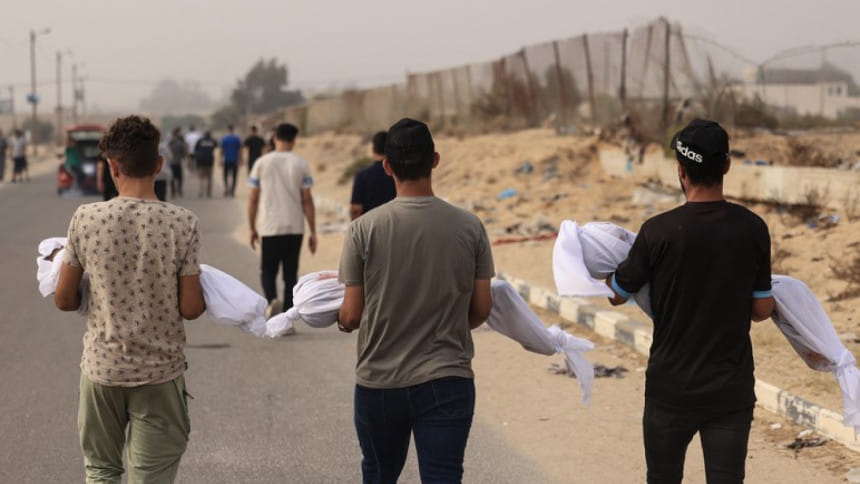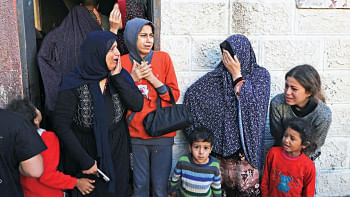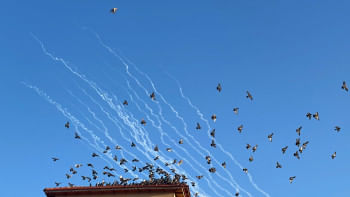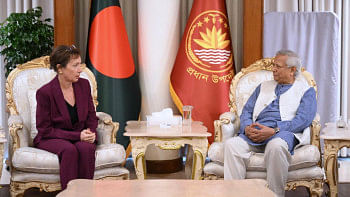Images you cannot unsee

The view from my window has taken on a new meaning for me over the last two months. It is a concrete jungle that stares back at me—columns of tall residential buildings almost stick together as every little space is "utilised." Between the gaps, you can see skeletons of other structures waiting to block the view of the buildings in the front. In fact, right in front of this chaotic mosaic of buildings of varying heights are two humongous under-construction monstrosities—rods sticking out, pillars half-built, a little bit of brick exposed here and there, a dusty safety net half-heartedly placed to protect passers-by from pieces of concrete hitting their heads. It looks like a ruin and is the final embellishment to complete this unsavoury installation against the bit of dull, smoggy sky.
But today, I am not complaining about the less-than-pleasant view outside my window. I am lucky to have a view at all. I am not going to go on a tirade about unplanned urbanisation, the near-total absence of greenery, or the oppressive air pollution that gives us regular "poor air quality" ratings in the Air Quality Index for Dhaka.
No, to be honest, I am grateful that I am in a position to observe these buildings and make out the feverish activity of their residents—though they look like miniatures from this distance. I am happy to see little children running up and down the thin iron steps on the terraces; their joy makes me set aside my nervousness at the shortness of the railings. I am reassured by the bright colours on the clothes line and the occasional spark from various corners from a worker dangerously perched on a ledge, welding together something or the other.
I am grateful because I don't have to see these—mostly residential buildings, full of women, men and children—crumbling to the ground one by one, bombs raining down from the sky. I am relieved that the skeletal structure, that awful eyesore that blocks chunks of the sky from the view, is not the ghost of an apartment building blasted away by an air strike.
I am grateful, most of all, to be alive and to know that my loved ones, friends, neighbours and colleagues—and all the babies and children I know and don't—are still breathing.
Because there are some things you just cannot unsee. I know you know what I mean. I don't want to remind you but I have to. I cannot unsee those endless rows of bodies wrapped in shrouds, out in the open; the dead calm of a mother describing the death of all three of her daughters and mother while trying to escape; the wailing of a little girl in unbearable physical pain and mental anguish, because her parents were blown off in a matter of seconds; the boy who begged his father to wake up even as he lay dead in wraps; the doctor who said on TV that he had no intention of leaving his patients and was then killed alongside his family; the juxtaposition of a grandfather sharing a fun moment with his cherubic grandchild and the same man holding her lifeless body to his heart—all a grim montage that keeps doing the rounds on social media. I can't forget that man running around with two plastic bags with his children's bloody remains in them, or the white phosphorus-covered little children looking in bewilderment and utter shock, as if to ask, "How could they do this to us?"
I have stopped trying to fathom the unfathomable. How can residential buildings, schools, churches and hospitals be bombed in the name of "self-defence"? How can an occupying force claim self-defence against a population it has confined in an "open-air prison" that it controls with brute force? How can children and babies be indiscriminately killed and be seen as "human shields" to justify their murders? How can minors and women be kept in prison without specific charges, or be sentenced to years in jail, many without any trial? How—after so much condemnation from all over the world and after only a few days of truce—can this sheer brutality that is being documented live and seen by all, be resumed with the same heartbreaking, horrifying images coming out of it on repeat?
"Gaza" is a word that we will remember all our lives. We will remember the faces of the smiling children and their families in the photos—the faces of people who have been wiped out for no fault of their own. We will remember the blatant bias of the Western media in compassionately covering the attacks on Israelis on October 7 while leaving out what had happened before: the 75 years of Israeli occupation of Palestine, the regular murdering of civilians by settlers and soldiers, the indiscriminate arrests and torture of the Palestinians, and the eviction of Palestinian residents from their own homes and lands. We will remember the dehumanising of people by Israeli officials, who have called Palestinians "human animals" and have no qualms about announcing that they will cut off water, food, and fuel as punishment. We will remember that "never again" does not mean "never again," because the current genocide of the Palestinian people is being allowed to happen (like other genocides before it—in Yemen, Syria, Afghanistan, Iraq, and so on) because they do not fall under the category of people who are "entitled to the Western world's leaders being outraged," even when they are systematically killed. Because they are on the wrong side of the fence, are of the wrong colour, or believe in the wrong religion, or all the above. We will remember how thousands of people all over the world, including those of the Jewish faith, marched in protest of the genocide and called for immediate ceasefire. We will remember how even millions of these voices of humanity could not prick the conscience of Western leaders to stop this barbaric, grotesque, and sadistic carnage against a people—against infants and children—who have the right to live in freedom on their own land.
It is evening already as I finish up this piece. I hear the cacophony of Dhaka's peak-hour traffic, see the smog of pollution, and feel winter's fog get thicker. I feel grateful again for the noise that signifies life, not death, and feel thankful that those dark clouds are not smoke coming up from a massacre below.
Aasha Mehreen Amin is joint editor at the Daily Star.
Follow The Daily Star Opinion on Facebook for the latest opinions, commentaries and analyses by experts and professionals. To contribute your article or letter to The Daily Star Opinion, see our guidelines for submission.

 For all latest news, follow The Daily Star's Google News channel.
For all latest news, follow The Daily Star's Google News channel. 








Comments